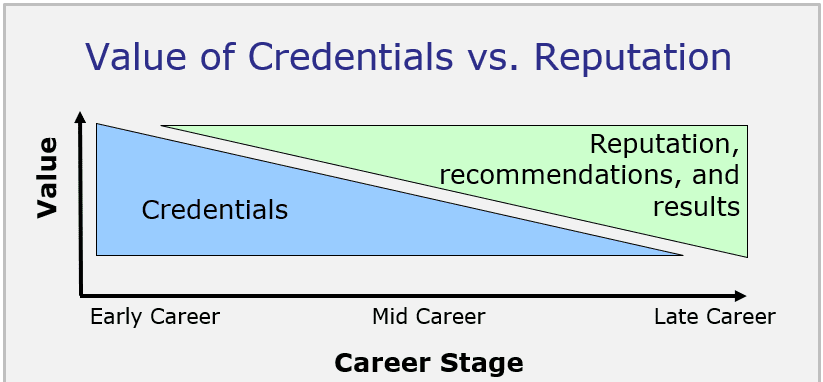As a new project manager looking for employment, getting your PMP credential makes a lot of sense. Many job postings ask for it, and it shows a fundamental level of understanding plus a commitment to the profession.
However, what about experienced project managers? Maybe you have 10+ years of project management experience already. You earned your position from a solid reputation for delivering results. Is there any point in pursuing your PMP credential now?
Yes, for reasons you might rather not think about.
Pathway 1 – Stable Employment
On one pathway, your career progresses predictably and does not require a PMP credential. Instead, your job performance, ability to network and develop new skills guide your opportunities. Within a stable organization, your reputation and results dictate how far you can progress and the choices you have on your career journey.
You can also use your professional network to move between organizations based on your reputation. Find roles you love and pursue them to the best of your ability. Continue to learn, grow, and mentor younger employees. This is a pattern for stable employment that most people followed for their entire careers. Credentials are important when starting out, then hiring decisions focus more on reputation, recommendations, and results.

Pathway 2 – Things Go Sideways

If the past few years have taught us anything, it is that the future is hard to predict. Also, because our world is more connected than ever (physically and electronically), change spreads quickly. Our once stable careers at multi-generational organizations are no longer as firm or predictable.
People change jobs more frequently; new technology and global competition disrupt industries faster than ever. The ecosystem of reputation and results that supported our careers with less reliance on credentials was tacit-knowledge-based and does not survive high rates of change.
Employment cycles are shortening, and we are more likely than ever to be searching for a new role. Your personal network, recommendations and endorsements are still extremely valuable. They represent your best chance of securing employment, but when entire industries see a shake up, you may find yourself looking outside your network for your next position. Then, having a PMP credential can seem like a wise insurance policy.
Risk Mitigation
Starting again in a new industry/organization/region can seem intimidating or exciting, depending on your perspective. On the one hand, you may feel like you are moving backwards and must reestablish your reputation in your new role. On the other hand, it is an opportunity to grow and prove your value in a new field with fresh stakeholders.
Having your PMP credential is a huge asset for finding a project management related position. If you are currently an experienced PM maybe it has been several years since you have submitted your resume for an opportunity. Today, automated resume screening is commonplace. You may be excluded from opportunities by a machine before anyone gets to read the glowing reviews your peers and sponsors have bestowed.
This resume keyword screening is unfair, but the reality. Great recommendations, reputation, and results don’t come up in search results, but the presence of the text “PMP” is very easy, so guess which gets searched for more often?
However, smart project managers have the edge over other professions. We deal with risk and uncertainty daily and we have techniques for assessing risks and exploring options. We can evaluate the cost of being out of work longer or having fewer employment choices because we do not currently have a PMP credential.
Earning a PMP later in your Career as a Threat Response
You probably have some rice, crackers, and tins of beans in your pantry. You may not plan on using them this week, but it is good to have them there as a contingency; it gives you options. Getting your PMP credential later in your career is a similar insurance policy. If you ever find yourself looking for a new role, you have a leg up on your peers that do not have it.
Looking for work is stressful enough, even when you meet all of the job requirements. The best time to hold a fire drill is on a pleasant day, without a fire. The same goes for gaining credentials to help with a job search. Do it when you are in a stable role as a contingency against future uncertainty. Hopefully, you will never need it, and maybe you will discover something new along the way.
Opening Doors to New Opportunities
A few years ago, the PMP exam radically changed to include 50% hybrid and agile content. It was also updated to reflect the increased focus on power skills (leadership and emotional intelligence) that PMI research indicated was critical to delivering successful project outcomes.
Many experienced project managers already apply aspects of hybrid and agile approaches learned from experience. Creating proof-of-concepts, validating understanding frequently to flush out issues, and empowering the team in local decision-making to build more commitment and autonomy. These are all pieces in the agile jigsaw. You likely have some additional helpful tools outside of the agile toolkit, but maybe agile has some things to teach too, or at least provide an industry name for a technique you have been calling something else.
Seeing the PMP Exam Content Outline (the scope statement or blueprint for the exam) can also expose roles you may not have considered. Maybe your work aligns more with a product owner or product manager role? Perhaps you enjoy working within a business unit with longstanding teams. If so, maybe a career in product development is more up your alley?

Pursuing a PMP credential means you will be exposed to the tools, techniques and roles PMI’s Job Task Analysis (JTA) research has identified as being the most relevant today. These are the skills hiring managers, PMOs, and sponsors seek most.
Just as doctors are required to take training to keep up to date with the latest thinking, studying for your PMP exam exposes you to today’s most used techniques. Also, because of your experience, the learning lift is small. Most concepts you will be familiar with leaving a relatively small percentage of net new content. However, these new small nuggets might be very helpful. Maybe building psychological safety so remote teams can collaborate faster is just what you’ve been looking for. If your toolbox is full of hammers, adding just one screwdriver or two can be well worth the effort.
Summary
If you are established in your project management career, earning a PMP credential now may not be quite as valuable as when you were starting out. However, it can be an excellent insurance policy against the downside of sudden career changes. Plus, you will likely learn something new, which might even open doors to career options you had not considered before.
Arguably, earning a PMP later is the easiest time to do so. You should know and be practicing most of the content tested. You don’t need to tell anyone you are taking the exam unless you want to, and there is no real downside. So, what you might consider unnecessary time and expense might be more of a prudent threat avoidance strategy with opportunities for gaining new tools and career options.
Spotlight on the Profession: Certifications in Project Management
Please let us know what's on your mind. We are here to help!
A Guide to the Project Management Body of Knowledge (PMBOK)® Guide, PMP®, CAPM®, PMI-ACP®, DASM®, and the PMI Authorized Training Partner Logo are marks of Project Management Institute, Inc.